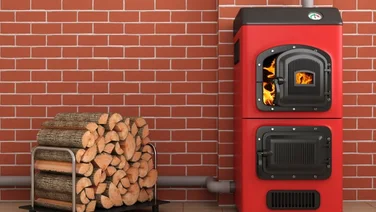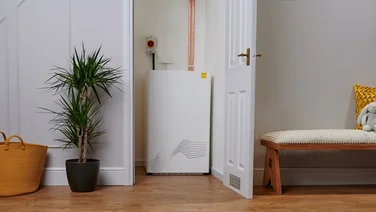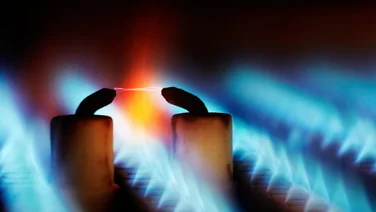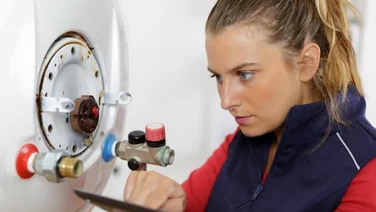We receive a small fee from trusted installers when you request a quote through our site. This helps us keep our content independent, well-researched and up to date – Learn more
✔ Electric combi boilers typically have a 99%–100% efficiency rating
✔ Electric combi boilers don’t need annual services
✔ A 28-34 KW combi boiler would be suitable for a three- to four-bedroom house
The government says its aiming to phase out 80% of gas boilers by 2035, although it hasn’t specified how it’ll achieve this (check out the cost of a new boiler).
Given that roughly 85% of UK homes are powered by gas (The Climate Change Committee, 2019), a lot of homeowners will be looking for greener alternatives in the coming years.
Enter, the electric combi boiler.
This popular heating system is a great alternative to gas boilers – it’s compact, easy on the eyes, and can reduce household emissions. But is an electric combi boiler suitable for your property? And, more importantly, is it worth it? Our comprehensive guide below has the answers.
Ready to find out how much an electric boiler will cost you? We can also help you with that. You can receive free, bespoke boiler quotes by popping a few quick details in this short form. Once we’ve received your information, we’ll pass it on to our trusted suppliers, who’ll then get in touch with you with quotes to compare.

What’s on this page?
What is an electric combi boiler?
A combi boiler combines water heating and central heating within one compact unit, meaning homeowners don’t need a bulky water storage tank.
Unlike system boilers, combi boilers heat up water when you need it, which is great for both the environment and your wallet.
It’s a pretty simple system too. Whenever you turn the hot water tap or pop the heating on, cold water is sourced from the mains, goes through the combi, and gets warmed by the heat exchanger.
An electric combi boiler simply means that this appliance is connected to the mains electricity supply, rather than gas or oil.
If you’re in the market for a new boiler, read our guide on what a new boiler might cost you.
Are electric combi boilers any good?
If you’ve had a head start on your research, you’ll know that electric combi boilers are a great option for many homes around the UK.
However, there are a few drawbacks to this heating system.
Reasons to buy an electric combi boiler
Compact product
Combi boilers are small, compact heating systems – ideal for people with limited space, or anyone concerned about how their boiler will affect the aesthetics of the room.
The reason behind their small frame is it combines both a water heater and central heating into a single unit, meaning there’s no need for additional hot and cold water tanks, which take up lots of space.
Having a smaller boiler also means they can be installed in standard kitchen cupboards or narrow spaces too awkward to be used for anything else.
Cheaper installation
Electric combi boilers are typically cheaper to install than their fossil fuel counterparts because they don’t have a flue (a duct, pipe, or opening that transports exhaust gases outside).
This means homeowners won’t have to install additional pipework when getting their boiler fitted, and will also avoid having to put up scaffolding on any properties above ground floor level.
Low-carbon heating
As the UK continues to introduce renewables into its energy mix, electricity is becoming much more environmentally friendly than gas – in fact, as of 27th June 2022, almost 40% of the National Grid’s electricity came from renewable sources. So by swapping an old gas boiler for a new electric boiler, you’ll reduce your household emissions massively.
However, it’s important to bear in mind that it won’t be completely emission free, as the UK’s energy mix still consists of about 40% gas, with other fossil fuels in the mix too.
Nearly 100% energy efficient
Although electric combi boilers are more expensive to run than gas boilers, they’re much more efficient.
Whilst most gas boilers have an efficiency rating of around 93%, electric combi boilers typically have a 99%–100% efficiency rating. This means you’ll need fewer units of energy (kWh) to produce the same amount of heat.
Think of it like this: for every £1 spent on heating a property with a boiler that’s 93% efficient, 7p is wasted on lost energy.
No annual service
Most home heating systems need servicing every year to make sure they’re ticking along nicely. However, homeowners with electric combi boilers can forget about annual services, meaning they’ll save between £50–£160 every year.
Why are electric combi boilers the exception for annual servicing? Unlike gas boilers, electric combis don’t need to have regular safety checks, which are carried out by a Gas Safe engineer to ensure that there are no potentially harmful leaks that could lead to health issues.
Quieter than gas boilers
If you’re fed up with your gas boiler’s monotonous hum, try swapping to a new electric combi boiler. Since there are no moving parts in the system and no burning of combustion fuel, electric combi boilers are almost completely silent.
No risk of a carbon monoxide leak
If you’ve ever owned a gas boiler, you’ll know that they can be susceptible to carbon monoxide leaks, which is when carbon monoxide escapes from the boiler system into the home and can lead to carbon monoxide poisoning.
Thankfully, this isn’t something you’ll need to worry about with an electric boiler, as there’s no gas involved in the process.
Compatible with solar
If you really want to cut back on your carbon emissions, you can pair your electric combi boiler with solar panels.
Not only will you be able to heat your home for free, but you also won’t be generating any emissions whilst you keep warm.
If your solar panel system isn’t big enough to cover all of your electricity bills, they’ll at least take the strain off hefty energy bills – something that will come in handy when the energy price cap increases again in October 2022.

Reasons not to buy an electric combi boiler
Could blow the fuse
Like the sound of electric combi boilers? Before you get one installed, it’s important to suss out the size of the fuse in your home. If you miss this step, you could risk having your brand new boiler blow the fuse – not off to the best start.
Many UK homes have either a 30- or 60-amp fuse, whereas a typical electric boiler uses 48 amps – enough to easily blow a 30-amp fuse. Thankfully, you can rely on your installer to check this – so long as you go with a trusted and professional installer.
Not suitable for every property type
Although electric combi boilers are suitable for most UK homes – and are often easier to install than alternative systems – homeowners with older properties might struggle to get them fitted.
This mainly comes down to the fact that many traditional homes and listed buildings in the UK don’t have suitable pipework for electric combi boilers. If this is the case, it means you’ll need to completely upgrade to the whole pipe system to make a combi boiler work.
Limited heating capacity
Electric combi boilers don’t cope well with multiple hot water appliances running – not ideal in a large house with lots of family members.
Usually, this means that if one hot tap is running, you won’t be able to turn on another one without both of them running at reduced pressure.
To avoid this, make sure you have the right size combi boiler. Generally, a 28-34 KW combi boiler would be installed in a three- to four-bedroom house, with up to 15 average-size radiators.
Currently expensive to run
Electricity and gas are both at the highest rates they’ve been for decades. Ofgem released a statement in April 2022, claiming that electricity will now cost people 28p per kWh, whilst gas would only cost 7p per kWh. This means electricity is four times more expensive than gas.
These prices are likely to put a lot of homeowners off the idea of having an electric heating system. However, many people in the renewable energy industry hope that this might change over time, as the government pushes for more green alternatives to gas.
Typically shorter warranties
Electric boiler warranties typically only last for two to three years, whereas most gas boiler manufacturers offer ones that last up to 10 years.
Surprisingly, this isn’t to do with electric boilers’ performance, but actually the lack of competition. Since most homes in the UK have gas boilers installed, the competition among manufacturers is fierce, which means they have to offer longer warranties to stand out from the crowd.
However, there are some suppliers out there that stray from the norm. Fischer, for example, provides a 10-year warranty for their electric combi boilers.
Is your home suitable for an electric combi boiler?
One of the major advantages of electric combi boilers is that they’re suitable for most small- to medium-sized properties in the UK.
They’re particularly useful for smaller spaces, thanks to their compact size. So if you’re currently living in a cramped flat, it’s time to get rid of that old bulky boiler and water tank, and replace it with a space-efficient electric combi.
Anyone living in flats that aren’t on the ground floor will also find electric combi boilers much easier to install than other types of boilers. Unlike gas boilers, electric boilers don’t have a flue, which means installers won’t have to put up scaffolding to install it.
However, homeowners in larger properties – or anyone in a home with a lot of people – won’t get along with a combi boiler because of its inability to provide water to more than one= appliance at a time. People in this situation will likely find themselves being blasted with cold water in the shower, or dealing with weak water pressure whilst they’re doing dishes.
On top of this, people in listed buildings might struggle to install a combi boiler because of the pipework that might be needed. In modern buildings, installing additional pipework wouldn’t be an issue, but homeowners aren’t allowed to change the structure of listed buildings.
Next steps
Electric combi boilers are definitely worth it for most small- to medium-sized modern properties around the UK. However, anyone living in a large house, or one that’s in a conservation area, should probably look into alternative heating systems.
Want to learn more about combi boilers before investing in one? Check out some of our helpful guides:
Once you’re ready to take the plunge and get yourself an electric boiler, it’s time to compare quotes. Luckily we can help with this.
To find the best deals on electric boilers, simply pop a few details in this short form, and our trusted suppliers will get in touch with tailored quotes.








